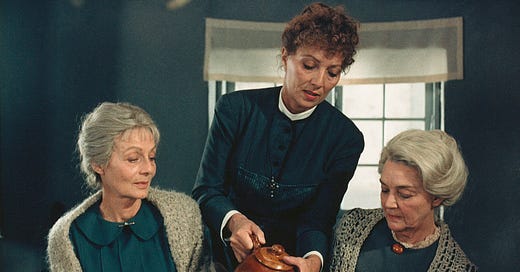Please don’t be mad the ‘Catholic film’ does not exist. Certainly, there are devotional films for specific religious sects, but cinema exists as an inherently secular artform. The word ‘secular’ does not preclude religious content from the artform. Writers, directors, and cinematographers may orient a film toward a specific interpretive community. In fact, creators cannot avoid doing so. Yet every film, as with every poem, statue, or novel, must address itself to the whole of humanity. Art focuses on the transcendentals: Oneness, Truth, and Goodness (beauty being a subset of truth and goodness). These transcendentals transcend the differences of nation, creed, and custom and offer a glimpse at universal realities through each individual experience. There is a reason this blog is called “100 Films Every Catholic Should See” and not “100 Catholic Films You Should See.” ‘Catholic films’ do not exist.
Why the diatribe against ‘Catholic film?’ Babette’s Feast would be a prime contender for this title of ‘Catholic film.’ Gabriel Axel’s 1987 Danish classic brims with religious themes, leading some academics over the years to term it a “religious film.” Beyond ‘religious film,’ the Catholic Cinephile has written a delightful and short piece on the Catholic symbolism (go read that now, and then come back). If that weren’t enough, Pope Francis has mentioned Babette’s Feast as his favorite film. If any ‘Catholic film’ existed, it would certainly be BF.
A Western Catholic perspective certainly helps viewers understand the film’s themes and a Danish Western Catholic perspective would be even more helpful, but viewers who watch Babette’s Feast as a ‘Catholic film’ cut themselves off from experiencing the whole film as it is. Viewers who seek a ‘Catholic film’ glean the film for interpretations as one would glean Divine Revelation. Such viewers wish to gain an interpretation of the film easily, with firm certainty, and without admixture of error. But I encourage you to go and watch Babette’s Feast without looking for a Catholic message. Films based in ideology are rarely worth the SD cards on which they’re stored. But films based on oneness, truth, and goodness will always yield great fruit.
If not a ‘Catholic film’ how should viewers interpret this film? The core of Babette’s feast exists deeper than a simple 1:1 allegory of Christian symbolism, or in the interplay between protestant and Catholic tradition. Symbolic elements frame the story. However, these symbolic elements complement and underline the human drama taking place. A question laps over the edges of this movie like the crashing waves on Jutland’s coast. This question nags. The question pokes the belly and growls within with hunger. The youth of the film ask “How am I to spend my life?” And as they age, they ask, “Have I spent my life well?”
These key questions come most clearly from Lorens throughout the film. Lorens Löwenheilm spends the most time with the Pietist circle, but he himself is not a Pietist. He is the outsider on the inside through whom the audience may read the clearest juxtapositions. He is the character that bridges the sensual Catholic world of Paris and the lean puritanical world of northeast Jutland. Having abandoned the simple and holy life he once pursued at the beginning of the film, he has spent his whole life chasing worldly gain. By the end of the film, he has “won.” He has been promoted to General. What’s more, he is in the inner circles of the Danish court. Yet, he looks himself in the mirror and quotes Ecclesiastes: “Vanity, all is vanity.” Nothing has satisfied him. No promotion, no social rise, no money has filled his hunger. He later turns and speaks directly to his younger self, sat sheepishly in his dressing chair as he prepares for the feast. “Tonight, you must prove to me what I did was right.” All the characters surrounding Babette are looking for some assurance that they are on the right path. The daughters wonder if they made the right choice in remaining with their father. Achille Papin aches in his Parisian apartment, pining for a family of his own. Regret and loss pervade as each person wrangles with the problems of evil and loss in their life. All question their lives except one: Babette Hersant herself.
Instead of asking why evil exists in the world, Babette’s Feast asks a different question: why is there good? Babette’s husband and child have been murdered by the French Army (A friend of General Löwenheilm’s, in fact). Babette has been exiled. She lost her job and everything she ever loved. In the face of such reckless fury, why not kill oneself? It seems that Babette is close to doing so when she first meets the daughters. Yet Phillipa and Martine show her kindness by allowing her to live with them. Babette works for free as their housemaid and cook. When sudden wealth and freedom smiles on her again through a winning lottery ticket, Babette gives back as freely as she has received. Her feast is the most opulent dinner for 12 that she can concoct. It does not matter whether her patrons recognize its goodness. Babette lavishes her people with the finest food available. In doing so, she unlocks a secret of life that few within the film grasp, but General Löwenheilm gives the best summation in a toast at the end of the meal:
Man, in his weakness and shortsightedness believes he must make choices in this life. He trembles at the risks he takes. We do know fear. But no. Our choice is of no importance. There comes a time when our eyes are opened, and we come to realize that mercy is infinite. We need only await it with confidence and receive it with gratitude. Mercy imposes no conditions. And lo! Everything we have chosen has been granted to us. And everything we rejected has also been granted. Yes, we even get back what we rejected. For mercy and truth have met together, and righteousness and bliss shall kiss one another.
In the great gift of her feast, Babette reveals the heart of the human condition. We are made to both give ourselves completely and receive completely. Man is not made for contracts wherein we say “this is yours, and that is mine.” Man is made most of all for a covenant with God wherein God says to us “I am yours, and you are mine.” As Gaudium et Spes observes, man cannot find himself except through a sincere gift of himself.
At the beginning of this post, I made a bold claim. I said the ‘Catholic film’ does not exist. It still doesn’t. Yet any film that touches on the transcendent will have Catholic themes. Catholicism is the bridge by which we are brought to Oneness, Truth, and Goodness Himself. In this way, there is no such thing as the ‘Catholic film’ because all films can be Catholic.
Babette’s Feast is a film that every Catholic should see multiple times. It is a classic in every sense of the word. Five stars. Go watch it tonight. When you are done, take a deep breath and praise God that you exist, thanking him for such a lavish gift that you cannot fathom. End your prayer like the simple pietist who has no other lines: “Halleluiah!”






